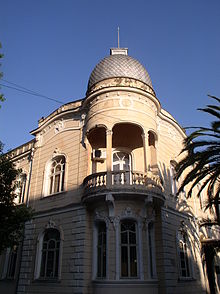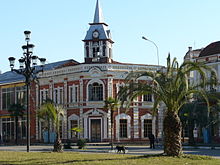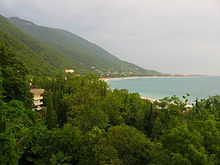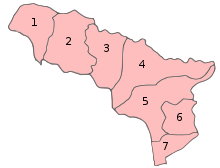Abkhazia
Abkhazia [ab'xa:ziən] (Abkhaz Аҧсны Aṗsny; Georgian აფხაზეთი Apchaseti; Russian Абхазия Abchasija) is a region bordering the Black Sea in the southern Caucasus. The population in 2011 was 242,862 according to official estimates, and the area covers 8,600 km².
Abkhazia considers itself an independent state under the name "Republic of Abkhazia", but is regarded by most states in the world as part of Georgia (see Autonomous Republic of Abkhazia). Abkhazia has had autonomous state structures independent of Georgia since 1993. Georgia does not exercise any sovereignty over the territory.
Since 2008, Russia, Nicaragua, Venezuela, Nauru and Syria (as of 2020) have been the only generally recognized states to recognize Abkhazia's independence. The Pacific island states Tuvalu and Vanuatu withdrew their recognition in 2011 a few years later, in the course of establishing diplomatic relations with Georgia.
The other de facto regimes, Arzakh, Transdniestria and South Ossetia, together with Abkhazia, form the community of non-recognized states and support each other in their respective aspirations for sovereignty.
Georgia and almost all other states in the world consider Abkhazia to be Georgian territory and regard the government of the Autonomous Republic of Abkhazia, which is in office in Georgia, as the legitimate government in the region. This government-in-exile is currently based in the Georgian capital, Tbilisi. It has no influence in the region.
Abkhazia, known for its mild climate as well as its spas and beaches, was one of the most popular domestic tourist destinations during the Soviet era.
Geography
Abkhazia is located south of the Caucasus on the northeast coast of the Black Sea west of the Enguri River in Georgia. The country, which is mountainous except for a narrow, agriculturally used coastal strip, reaches altitudes of over 4000 metres. The Arabika massif is home to the Werjowkina cave and the Woronja cave, the deepest known caves in the world at over 2000 metres.
Thanks to the protection provided by the mountain ranges, the coastal strip has a subtropical climate, which is why Abkhazia became a popular holiday destination during the Soviet era. The warm climate also favors the cultivation of tobacco, tea, wine and fruit, so that agriculture and the food and luxury food industry are among the most important economic sectors of the country.
Management structure
The de facto independent Republic of Abkhazia consists of seven rajons and one independent city, the capital, Sokhumi. Each rayon has a district capital.
| Rajon (No. on map) | Abkhazian name | Russian term | Administrative headquarters |
| Rajon Gagra (1) | Гагра араион | Гагрский район | Gagra |
| Rajon Gali (7) | Гал араион | Галский район | Gali (Gal) |
| Rajon Gudauta (2) | Гәдоуҭа араион. | Гудаутский район | Gudauta |
| Gulrypsh Rajon (4) | Гәылрыҧшь араион. | Гулрыпшский район | Gulripschi (Gulrypsch) |
| Ochamchyra Rajon (5) | Очамчыра араион. | Очамчырский район. | Ochamchire (Ochamchyra) |
| Rajon Sochumi (3) | Аҟәа араион. | Сухумский район | Sochumi (Sukhum / Aqwa) |
| Rajon Tkuartschal (6) | Тҟәарчал араион. | Ткуарчальский район. | Tqwartscheli (Tkuartschal) |
| City of Sochumi | Аҟәа | Город Сухум | Sochumi (Sukhum / Aqwa) |
Cities
In Abkhazia there are nine places with city status (as defined by the government in Sokhumi), seven of which are rayon capitals. According to Georgian law, two of the localities (marked with *) are not cities, but "small towns" (daba, corresponding to the former settlements of urban type). In addition to the cities listed below, there are several other localities, some of which have higher population numbers but do not have city status, such as Zandrypsh, Dranda, Bsybta or Eschera.
| Abkhazian name | Russian name | Georgian name | Inhabitants | Booth | Rajon |
| Aqwa (Аҟəа) | Sukhum (Сухум). | Sochumi (სოხუმი) | 64.478 | 2011 | Sochumi |
| Gagra (Гагра) | Gagra (Гагра) | Gagra (გაგრა) | 12.364 | 2011 | Gagra |
| Gwdouta (Гəдоуҭа). | Gudauta (Гудаута) | Gudauta (გუდაუთა). | 8.514 | 2009 | Gwdouta |
| Gal (Гал) | Gal (Гал) | Gali (გალი) | 7.605 | 2011 | Gali |
| Ochamchyra (Очамчыра) | Ochamchira (Очамчира) | Ochamchire (ოჩამჩირე) | 5.280 | 2011 | Ochamchyra |
| Tqwartschal (Тҟәарчал). | Tkuartschal (Ткуарчал) | Tkvartscheli (ტყვაჩელი) | 5.013 | 2011 | Tqwartschal |
| Pizunda (Пиҵунда)* | Pizunda (Пицунда) | Bitschwinta (ბიჭვინთა) | 4.198 | 2011 | Gagra |
| Gwylrypsch (Гәылрыҧшь)* | Gulrypsh (Гулрыпш) | Gulripschi (გულრიფში) | 3.910 | 2011 | Gwylrypsch |
| Afon Tschyz (Афон Ҿыц) | Nowy Afon (Новый Афон). | Achali Atoni (ახალი ათონი) | 1.518 | 2011 | Gudouta |

Architecture in the capital Sochumi

The town of Gudauta

Abkhazian Black Sea coast near Gagra

Management structure
Politics
The Abkhazian parliament, the "People's Assembly", consists of 35 deputies. The political landscape is composed of numerous parties and several larger "socio-political movements". In 2002, 2003 and 2004, the People's Assembly repeatedly appealed unsuccessfully to the Russian legislature to establish associated relations with Abkhazia, to include the republic in the Russian customs and monetary system by treaty, and to provide military protection. In the course of the 2008 Caucasus war, Russia finally recognized Abkhazia's independence in August 2008.
The US non-governmental organisation Freedom House classified Abkhazia as a "partly free" state in 2012. Georgia was also classified as partly free in this study.
Elections
The first president of Abkhazia from 1994 to 2005 was the historian Vladislav Ardsinba. On 12 February 2005 he was replaced by Sergei Bagapsh, who achieved a 91.54% share of the vote in the election of 12 January 2005. His opponent, Jakob Lakoba, received 4.5%. The ballot was preceded by a rigged election on October 3, 2004, in which former Prime Minister Raul Chajimba was declared the winner. After protracted wrangling, the Supreme Court ordered a rerun of the election in January. Raul Chadschimba did not run in the second election. The January election was also not completely proper. Some ethnic Georgians living in the eastern Abkhazian province of Gali were prevented from voting, but often did not have Abkhazian citizenship either, which meant that they were not entitled to vote under Abkhazian law.
Khadzhimba also contested the 2011 presidential election in Abkhazia, where he was again soundly defeated by Alexander Ankwab, before being elected president in the 2014 presidential election in Abkhazia and re-elected for the time being in autumn 2019. On January 13, 2020, Khadzhimba signed a letter of resignation as the Supreme Court's cassation authority annulled the autumn 2019 election results. The Election Commission set new elections for March 22, 2020. These were then won by Aslan Bschania, who has been the country's president since April 2020.
Status
Abkhazia belongs to Georgia under international law. The United Nations has reaffirmed this time and again since 1993. The UN Security Council "reaffirms the commitment of all member states to the sovereignty, independence and territorial integrity of Georgia within its internationally recognized borders." Some international law experts consider Abkhazia a stabilized de facto regime.
Russia recognized Abkhazia as an independent state on 26 August 2008, Nicaragua on 3 September 2008, Venezuela on 10 September 2009, Nauru on 15 December 2009, and in late May 2018 Syria expanded the short list of recognizing states to five.
External relations
Abkhazia maintains diplomatic contacts with the countries that have recognized its independence and with other states. So far, Abkhazia has only maintained embassies abroad in Russia, Venezuela and South Ossetia, but it also runs several representative offices in other states, has many honorary consuls and cooperates with non-governmental organizations, especially in the Circassian diaspora.
Abkhazian papers, as well as Russian passports issued in Abkhazia, are practically accepted only by Russia. On the anniversary of the beginning of the Caucasian War, August 8, 2017, Russian President Vladimir Putin visited Abkhazia and stressed that Moscow would continue to firmly support the independence and security of the province. The meeting with Abkhazian head of government Raul Khadzhimba took place only a week after US Vice President Mike Pence's visit to Georgia, which was interpreted by Western observers as a deliberate provocation against Tbilisi.
Relations with Georgia
There are no diplomatic relations between Abkhazian and Georgian government agencies. The Georgian government under Bidsina Ivanishvili, elected in 2012, signalled a willingness to talk for the first time in mid-2013 and also admitted partial misconduct in the 2008 Caucasian war.
The Georgian government under Mikheil Saakashvili intended to reintegrate Abkhazia into Georgia on the model of the transfer of power in Ajaria. On 22 September 2004, Saakashvili had presented a three-stage plan to the UN General Assembly to resolve the conflicts in Abkhazia and South Ossetia. A first stage provided for confidence-building measures between non-governmental organizations, students, journalists, doctors, athletes and mothers. At the second stage, the conflict zones were to be demilitarized under international supervision. Finally, on the third, Georgia wanted to grant Abkhazia and South Ossetia the greatest possible autonomy. Supporters of the Abkhazian peace process are Germany, France, Great Britain, Russia and the USA.
The government of Abkhazia had rejected the Georgian plan. Russia also rejected a reunification of Abkhazia with Georgia and, in accordance with the 1995 Moscow Agreement concluded with Georgia, did not want to withdraw its peacekeeping force in order, according to its own statements, not to allow any new bloodshed on its borders.
In July 2006, the Georgian government sent special Interior Ministry units to Abkhazia's Upper Kodori Gorge, where Emsar Kvitsiani had declared autonomy over the territory. Within a few days, they defeated the Russian-backed rebels. On 27 September 2006, President Saakashvili decreed that the Upper Kodori Gorge be renamed Upper Abkhazia. At the same time, the Abkhazian government-in-exile under Malchas Akishbaia took up residence there in the village of Chkhalta. From now on, diplomats accredited in Tbilisi who wanted to visit Sochumi had to first pay a visit to the government-in-exile in Chkhalta. Abkhazia's President Bagapsh expressed his anger. He explained that anyone visiting the government-in-exile in Chechalta would not be received in Sochumi.
On 12 August 2008, the Georgian army was driven out of its last positions in the upper Kodori Gorge by Abkhazian and Russian troops. Thus, after the defeat in South Ossetia, Georgia has also completely lost control over Abkhazia. The central administrative building of the Georgian government in the provincial capital of Chkhalta was completely destroyed.
Inner problems and attitudes towards independence
While the coexistence of Abkhazians, Russians and Armenians mostly runs smoothly, there are problems with the integration of inhabitants of Georgian origin in the country, who are often suspected of being Georgia's fifth column. Only about one in two Georgians in Abkhazia said they had never been discriminated against because of their origin. Since the country achieved de facto independence, there have been and continue to be repeated acts of sabotage and even isolated attacks against institutions of the Abkhazian state in the southern regions, which are inhabited by a majority of Georgians.
The relationship between Abkhazia and its Georgian minority is therefore marked by mistrust. The Gali rayon is particularly affected. The Abkhazian police have little influence there, which leads to a significantly higher crime rate. According to a study by the University of Colorado Boulder, however, most Georgians have now come to terms with the situation. Nearly 50% of Georgia's minority support the country's continued existence as a separate state, while less than 20% believe a return to Georgia is necessary. A return to Georgia is almost unanimously rejected by all other population groups. Only 1% of ethnic Abkhazians and 2% of Armenians and Russians explicitly supported it. While larger segments of the population among Russians (38%) and Armenians (51%) would support annexation to Russia, only a smaller share (19%) among Abkhazians would do so. Almost 80 % of them are in favour of permanent independence for the country.
Questions and Answers
Q: What is Abkhazia?
A: Abkhazia is an unrecognised country in the Caucauses that declared its independence from Georgia in 1991.
Q: How did Abkhazia gain independence?
A: Abkhazia gained independence through a war with Georgia for its independence in 1991, known as the Georgian–Abkhaz conflict.
Q: Does Georgia recognise Abkhazia's sovereignty?
A: No, Georgia believes Abkhazia is part of its territory and has listed the province, in its official subdivisions, as an autonomous republic. In 2008, the Parliament of Georgia passed a resolution declaring Abkhazia a "Russian-occupied territory".
Q: Is Abkhazia recognised by any other countries?
A: Yes, it is formally recognised by Russia and by Nicaragua, and the de facto independent republics of South Ossetia and Transnistria. The European Union, OSCE, and NATO also recognise it as an integral part of the territory of Georgia.
Q: What caused the Georgian–Abkahz conflict?
A: The secessionist movement of the Abkahz minority led to this conflict.
Q: What was the outcome of this conflict? A: The War in Abkahz resulted in a Georgian military defeat and mass exodus and ethnic cleansing of Georgians from this region.
Q: Is there currently any peacekeeping operation taking place in this region? A:Yes there is a UN-monitored and Russian-dominated CIS peacekeeping operation taking place here but unfortunately so far no resolution has been made regarding sovereignty dispute between these two countries which remains a source of tension between them.
Search within the encyclopedia